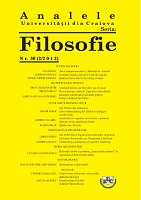CONCEPTUL OMULUI NATURAL LA TOMA DIN AQUINO
THE CONCEPT OF NATURAL MAN IN THOMAS AQUINAS
Author(s): Adriana NeacșuSubject(s): Christian Theology and Religion, 19th Century Philosophy, Philosophy of Religion
Published by: Editura Universitaria Craiova
Keywords: natural man; innocent men; body; soul; knowledge; passions; redemption; animal being; spiritual being;
Summary/Abstract: Although the concept of natural man was developed in the seventeenth and eighteenth centuries by philosophers such as Thomas Hobbes, John Locke and Jean-Jacques Rousseau, the present study aims to highlight this concept in Thomas Aquinas, focusing on his work Summa Theologiae, Part I. He claims that Thomas, although he does not properly formulate this concept, he clearly expresses it when he talks about the "innocent man" as he manifests himself within Paradise, according to his essence or nature given to him by God. The natural man opposes to the man integrated into the historical existence, developed as a result of sin, and where he has no longer kept the "right order of the initial state", getting another "status". For Thomas, describing the natural man (in his "state of innocence") is an opportunity to rethink, within the context of the Christian religion, the human condition. The model of original human nature makes us easily understand that it is the internal support of all our remarkable deeds as well as of the progress on the path leading to salvation. The latter is not only the regain of man’s paradisiacal condition, which involves the status of composed being, but its overcoming it by its full spiritualization, which would not be achieved naturally if the way to be human wouldn’t be, by its nature, open to such a possibility.
Journal: ANALELE UNIVERSITĂȚII DIN CRAIOVA. SERIA FILOSOFIE
- Issue Year: 2/2012
- Issue No: 30
- Page Range: 24-51
- Page Count: 28
- Language: Romanian

